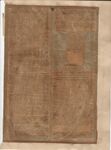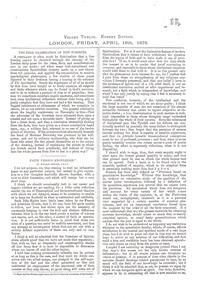< The Todas (continued from page 7-88) >
“Late Madras, C. S.,” sides with Mrs. Showers in the insinuation that I never was in India at all. This reminds me of a calumny of last year, originating with “spirits” speaking through a celebrated medium at Boston, and finding credit in many quarters. It was, that I was not a Russian, did not even speak that language, but was merely a French adventuress. So much for the infallibility of some of the sweet y angels!” Surely, I will neither go to the trouble of exhibiting to any of my masked detractors, of this or the other world, my passports vised by the Russian embassies half a dozen times, on my way to India and back. Nor will I demean myself to show the stamped envelopes of letters received by me in different parts of India. Such an accusation makes me simply laugh, for my word is, surely, as good as that of anybody else. I will only say, that more’s the pity that an English officer, who was “fifteen years in the district,’’ knows less of the Todas than I, whom he pretends never was in India at all. He calls goparam a “tower” of the pagoda; why not the roof, or anything else, as well? Goparam is the sacred pylon, the pyramidal gateway by which the pagoda is entered; and yet I have repeatedly heard the people of Southern India call the pagoda itself a goparam. It may bea careless mode of expression employed among the vulgar; but when we come to consult the authority of the best Indian lexicographers we find it accepted. In John Shakespear’s Hindustani-English Dictionary (edition of 1849, p. 1,727), the word “goparam” is rendered as “an idol temple of the Hindus.” Has “Late Madras C.S.,” or any of his friends, ever climbed up into the interior, so as to know who or what is concealed there? If not, then perhaps his fling at me was a trifle premature. I am sorry to have shocked the sensitiveness of such a philological purist, but, really, I do not see why, when speaking of the temples of the Todas—whether they exist or not—even a Brahmanam-Guru might not say that they had their Goparams? Perhaps he, or some other brilliant authority in Sanskrit and other Indian languages, will favour us with the etymology of the word? Does the first syllable, go, or gu, relate to the roundness of these “towers,” as my critic calls them (for the word go does mean something round), or to 'gop, a cow-herd, which gave its name to a Hindu caste, and was one of the names of Kristna, go-pdl meaning the cowherd? Let these critics carefully read Col. Marshall’s work, and see whether the pastoral tribe, whom he saw so much, and discovered so little about, whose worship (exoteric, of course) is all embraced in the care of the sacred cows and buffaloes; the distribution of the (idivine fluid”—milk; and whose seeming adoration, as the missionaries tell us, is so great for their buffaloes, that they call them the “gift of God,” could not be said to have their goparams, though the latter were but a cattle-pen, a tirieri, the mand, in short, into which the phrenological explorer crawled alone by night with infinite pains and—neither saw nor found anything! And because he found nothing, he concludes they have no religion, no idea of God, no worship. About as reasonable an inference as Dr. W. B. Carpenter might come to if he had crawled into Mrs. Showers’s séance room some night when all the “angels’’ and their guests had fled, and straightway reported that among Spiritualists there are neither mediums nor phenomena.
Colonel Marshall I find far less dogmatic than his admirers. Such cautious phrases as “I believe,” “I could not ascertain,” “I believe it to be true,” and the like, show his desire to find out the truth, but scarcely prove conclusively that he has found it. At best it only comes to this, that Colonel Marshall believes one thing to be true, and I look upon it differently. He credits his friend the missionary, and I believe my friend the Brahman, who told me what I have written. Besides, I explicitly state in my book (see Ists,vol. ii., pp. 614-15):—“As soon as their (the Todas) solitude was profaned by the avalanche of civilization . . . the Todas began moving away to other parts as unknown and more inaccessible than the Neilgherri hills had formerly been.” The Todas, therefore, of whom my Brahman friend spoke, and whom Captain W. L. D. O’Grady, late manager of the Madras Branch Bank at Ootacamund, tells me he has seen specimens of, are not the degenerate remnants of the tribe whose phrenological bumps were measured by Colonel Marshall. And yet, even what the latter writes of these, I, from personal knowledge, affirm to be in many particulars inaccurate. I may be regarded by my critics as over credulous; but this is surely no reason why I should be treated as a liar, whether by late or living Madras authorities of the “C. S.” Neither Captain O’Grady, who was born at Madras, and was for a time stationed on the Neilgherri hills, nor I, recognised the individuals photographed in Colonel Marshall’s book as Todas. Those we saw wore their dark brown hair very long, and were much fairer than the Badagas, or any other Hindus, in neither of which particulars do they resemble Colonel Marshall’s types. “H. M.” says, “The Todas are brown, coffee coloured, like most other natives;” but turning to Appleton’s Cyclopedia (vol. xii. p. 173), we read: “These people are of a light complexion, have strongly marked Jewish features, and have been supposed by many to be one of the lost tribes.” “H. M.” assures us that the places inhabited by the Todas are not infested by venomous serpents or tigers; but the same Cyclopedia remarks that the mountains “are swarming with wild animals of all descriptions, among which elephants and tigers are numerous.”
But the “Late” (defunct?—is your correspondent a disembodied angel?)—“Madras C. S.” attains to the sublimity of the ridiculous when, with biting irony, in winding up, he says:—“All good spirits, of whatever degree, astral or elementary,... prevent his (Capt. R. F. Burton’s) ever meeting with Isis;—rough might be the unveiling!” Surely—unless that military Nemesis should tax the hospitality of some American newspaper, conducted by politicians—he could never be rougher than this Madras Grandison! And then, the idea of suggesting that, after having contradicted and made sport of the greatest authorities of Europe and America, to begin with Max Muller and end with the Positivists, in both my volumes, I should be appalled by Captain Burton, or the whole lot of captains in her Majesty’s service—though each carried an Armstrong gun on his shoulder and a mitrailleuse in his pocket—is positively superb! Let them reserve their threats and terrors for my Christian countrymen.
Any moderately equipped Sciolist (and the more empty-headed, the easier) might tear Isis to shreds, in the estimation of the vulgar, with his sophisms and presumably authoritative analysis, but would that prove him to be right, and me wrong? Let all the records of medial phenomena, rejected, falsified, slandered, and ridiculed, and of mediums terrorised, for thirty years past, answer for me. I, at least, am not of the kind to be bullied into silence by such tactics, as “Late Madras” may, in time, discover; nor will he ever find me skulking behind a nom de plume when I have insults to offer. I always have had, as I now have, and trust ever to retain, the courage of my opinions, however unpopular or erroneous they may be considered; and there are not Showers enough in Great Britain to quench the ardour with which I stand by my convictions.
There is but one way to account for the tempest which, for four months, has raged in The Spiritualist against Colonel Olcott and myself, and that is expressed in the familiar French proverb—“Quand on veut tuer son chien, on dit qu’il est enrage.”
New York, March 24th, 1878.
The Free Examination of New Subjects
A Complaint is often made by Spiritualists that a free hearing cannot be obtained through the channel of the London daily press for the ideas, facts, and manifestations now in our midst; yet when some well-intentioned and conscientious Spiritualists recently made up a new theory from old opinions, and applied the resuscitation to modern psychological phenomena, a few readers of these pages objected to their brethren having a hearing in the columns of The Spiritualist. Surely the experience of all of us should by this time have taught us to freely examine all subjects and facts whatever which can be found in God’s universe, and to do so without a particle of bias or of prejudice; thus may we sometimes entertain angels unawares, and sometimes turn away intellectual defaulters without their being able to justly complain that they have not had a fair hearing. That dogged intolerance or obtuseness of which we complain in others, let us not exhibit ourselves. Our general conclusion about the lengthy controversy on Theosophy is this—That the advocates of the doctrines have advanced them upon a creedal and not upon a scientific basis. Instead of giving us first a dozen facts, and then a conclusion irresistibly flowing from the facts, they have given us a dozen conclusions based upon, say, a solitary fact, relevant to no one of the twelve points of doctrine. If the picture evolved abnormally beneath the hand of Madame Blavatsky was produced by her willpower, and not by ordinary mediumship, why does she let those who attest the fact puzzle themselves as to the nature of the drawing, instead of explaining the points on which her friends record their perplexity, and instead of laying bare the whole process from first to last in a plain way?
Faith Versus Knowledge*
I DO not propose, sir, this evening to read an exhaustive paper on any particular subject, but merely to give expression to a few thoughts hurriedly thrown together, with a view to elicit discussion, and which will occupy but a very short time.
<... continues on page 7-90 >
* A Paper read last Monday night before the British National Association of Spiritualists.
Editor's notes
Sources
-
London Spiritualist, No. 295, April 19, 1878, p. 181


